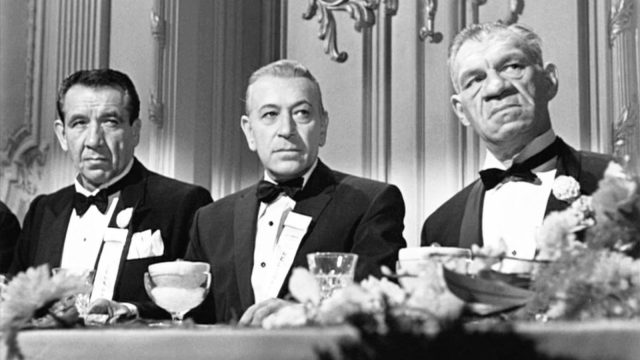George Raft wasn’t much of an actor, goodness knows. Not terrible, but not great, either. He would’ve been the first guy to tell you that. He became an actor for the same reason he became a boxer and a taxi driver—because it looked fun and easy. He’d rather get paid for that than do actual serious work. Which, you know, who can blame him? If I wanted to do hard work, would I be knocking out five paragraph essays about George Raft?
On the other hand, by deciding to write about him, I discovered that he lived a fascinating life. Unlike a lot of men of Raft’s ilk, he was born into poverty—he actually lived in Hell’s Kitchen as a child. He left school at twelve and home at thirteen. He boxed, though no one seems clear on his record. He played ball, though apparently not very well. His mother taught him to dance, and he worked first as a taxi dancer and then as a performer. He later said of his own performing that he wasn’t Astaire or Kelly, but he was “sensuous.” Astaire said Raft had the fastest Charleston he’d ever seen.
His work for Texas Guinan as one of her lead performers led to his going to Broadway. From Broadway, the appeal of the pictures—and, allegedly, needing to escape from a paramour’s husband—sent him to Hollywood. He was never a huge star, but he was a decent one. His appearances include Scarface and Some Like It Hot, and according to Hollywood tradition, he was the first gangster to do the coin-flipping thing.
Oh, yeah, the mob ties. One of his friends from childhood was some guy named Benjamin Siegel who had a nickname he hated. Raft worked as a wheelman for him and acknowledged that playing mobsters pretty well prevented him from being a mobster. He knew lots of other mobsters, and legend has it that, when Jimmy Cagney spent his time as president of the Screen Actors Guild fighting the mob in Hollywood, a hit was put on him that Raft was able to call off. He even had a hard time getting a job at the Flamingo Hotel because of his associates and was even in Havana working for Santo Trafficante, Jr., the night rebels took the city.
Apparently, Raft spent his money as quickly as he earned it; he lived the last years of his life on a combination of Social Security and pensions. I’m a little curious as to what happened to his shares in the Flamingo; he certainly didn’t own them when he died and left practically no estate behind. He also spent literally decades financially supporting a woman he married in 1923 who wouldn’t divorce him because she was Catholic. All in all, an extremely interesting man.
I, too, am trying to make a living on Social Security; consider supporting my Patreon or Ko-fi!

